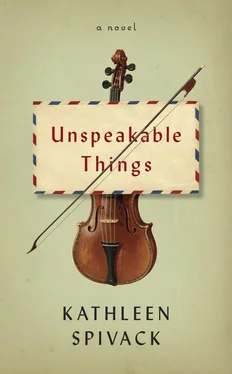But Joe always got special treatment, she told him, and she was his girl each time he came to port. The lovely Carmelita was nineteen, and Joe was young for a captain, age twenty-three. Neither could understand a word of what the other said, but they were in love. It also helped that Joe was good-looking, virile, and always paid her several times more than what she asked. This time, he would have a lot to give, the “whole wad,” as he said to himself. Arrangements had already been made.
Joe’s ship, the Calypso, was a rust bucket loosely affiliated with the Allied effort, and she was charged with ferrying goods up and down the coast of the Americas, legally or not. The main purpose of the Calypso was to dodge, by any means she could, the German submarines lurking about, and get supplies to American troops. The little tramp steamer was so beat-up-looking that no one took it too seriously. So she operated in relative calm. The Calypso carried munitions, sugar from Aruba and Cuba, and general cargo. On this last trip from New York to Venezuela, the Calypso had carried a holdful of boxes of cornflakes, toilet paper, fashion magazines in Spanish that had been printed in New York, and a few heavy, ornate coffins, corpses being returned home to Caracas. This all had to be unloaded before the Calypso could make the return trip. It was all the same to Joe Riley and his men; as long as they and the owners lined their pockets, everyone was happy.
“A kiss. Give us a kiss,” Sugar jabbered. Joe hiked the parrot farther up his arm and fished in his pocket for a piece of banana. He stuck a morsel between his lips, puckered up, and the parrot sidled up his shoulder to peck the morsel from Joe’s mouth. Sugar immediately started shrieking for more, but Joe ignored her.
They were loading the Calypso now, and Joe walked down to the loading dock to see how it was going. He squinted as a large crate was being jerked onto the deck of the Calypso. It hung in the air and swayed. He watched with a critical eye as the crate settled onto the deck of the ship and was lashed down. “Easy. Take it easy there,” he called to his men. He fingered the large wad of hundred-dollar bills in his pocket and fed the parrot one more ripe banana morsel.
Then he walked over to the port office, filled out the necessary papers, and pushed the parrot’s beak away from his lips. “A kiss! A kiss!” the bird shrieked angrily. But Joe was busy now, and the parrot, waddling sideways, anchored herself anew on his shoulder, chucking and muttering as Joe signed the exit papers.
Next, he had to go find the rest of his crew, make sure that the papers of the scruffy new sailors who had signed on in La Guaira were properly falsified, and then go rouse the last of his men who were in the local jail, sleeping off what had been a bad, or good, night, depending on one’s point of view. More money changed hands, the customary bribe to the local port authorities. By this time, Joe was almost ready for his afternoon siesta, so he strolled back to find Carmelita one last time.
As the Calypso, reeking of liquor fumes brought along with the crew coming back on board, steamed out of port late in the afternoon, the men working on deck could hear faint groans and clawing from inside the crate on deck. They reported this to their captain, who told them to ignore it. Joe ordered one of his able seamen to make sure the crate was firmly lashed down, and the groans soon became drowned by the winds that howled around the little Calypso as she steamed north. At night, during the graveyard watch, the cook’s boy would put a pot of rice and leftovers out on deck, and by morning it would be gone. But the sailors knew better than to ask questions.
As the northern shore of Venezuela receded, Captain Joe Riley, pacing the bridge, thought fondly of Carmelita and of their last wild afternoon “siesta” together. She had actually cried when it was time for him to leave, real tears that streamed down along with her mascara. She’d wound her leg two times around his neck and, with her big prehensile toe, scratched him delicately behind his ears, a trick she knew he loved.
“I’ll be back soon,” Joe said, kissing her stump one last time. He tried to comfort her as well as himself. To make sure she knew he meant it, he took out a wad of bills, counted out two thousand dollars, and put them into her hand. That very same two thousand had been stuffed into his pocket just the day before in a transaction that had been so unpleasant and secretive, he didn’t want to think about it. Dear Carmelita, could anyone need the money more? And oh, what wonderful times they had together. He sighed. For sure, he’d never find a girl back home as sweet as that little whore.
Although Joe had agreed to transport his cargo to New York, he knew he could not get past the authorities there. The run was already dangerous enough. He decided to put the crate ashore before the Calypso reached New York, somewhere along the New Jersey coast, near Cape May. He went in as close as he could by night, watchful of the submarines. Then he stalled the engines, launched a lifeboat, got the wretched musicians in it, and rowed the Quartet as close in as he dared. He beached them in the shallows, near the barrens, the mosquito-ridden swamplands of New Jersey. From there, the musicians and their instruments would make their way slowly to New York City by bus. They had some money sewn into the red silk linings of the instrument cases, not much, but they would find a bus somewhere that would get them to New York. Although they had always wanted to enter the gleaming city in triumph, this was not to be. Once on the bus, they cringed, slid down in their seats, and drained the last dregs from their bottles of schnapps. Somewhere, they had heard, there was perhaps a last living relative of the Tolstoi family who would allow them to survive for a time in her coal cellar, or at least until they came up with another, more practical solution.
Herbert arrived at the psychiatric hospital, where he opened and closed doors. “How is my wife?” he asked quickly, anxiously, of the nurse in the hallway. He was panting, worried that he might be late. “Has she been asking for me?”
“She’s fine,” replied the nurse, barely looking up. “She’s in there. She’s been a bit difficult today. Perhaps it is the weather.”
“Gracious lady,” he said softly. Charm was a reflex for him.
“She’ll be all right, I am sure, sir. It’s just the shock of it all. Really.” The nurse hesitated. “Perhaps you would like a cup of tea?”
“Ah, dear lady, you are too kind.” Herbert’s face betrayed his weariness.
“In there,” said the nurse, gesturing. “I’ll bring it in to you. Go now. She’s been waiting for you all day. She keeps forgetting where she is.”
Herbert looked stricken. “Yes,” he said, half to himself. He stood before the double doors of the ladies’ ward and squared his shoulders. The steam pipes hissed throughout the old brown building — steam pipes as big as the bus that had burrowed its way through the streets, tunneling him here to visit his mad wife. He was becoming a man of dark places: the library where he received his supplicants; the tenement where he lived with his elder son’s wife and children; the cafeterias of New York where he planned and waited and wrote letters; and now this dim, high-ceilinged room where ladies lay, muttering to themselves. He gathered his forces.
“Adeline!” he cried, bounding in what he hoped was an optimistic manner into the shadowed room. Once again, an aureole of light seemed to lift him by his meager hair, catch his large flapping ears and hook-winged shoulders, and propel him forward with energy. He sank in a subservient heap beside the bedside of his wife and took her hands in his. He kissed first one inert hand and then the other. She gave no answering pressure to his clasp. “Adeline, my darling!” he cried, and bent and kissed her lips.
Читать дальше












